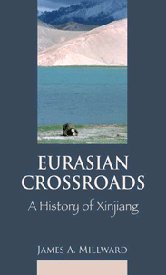English by Wang Gang: A Book Review
by Wang Gang
Review by Josh Summers
First published in 2004, Wang Gang’s English has become an unexpected bestseller in China and has won numerous awards including the 2005 “Best Novel of the Year” from the prestigious People’s Literature Publishing House.
Almost five years later, with rights to the Xinjiang novel sold around the world, it is finally being published by Viking Penguin into the language from which its title is derived. Translated from the Chinese by Martin Merz and Jane Weizhen Pan, it remains yet to be seen whether English will prove as popular on the international market as it has been back in its home country.
Early Life in Xinjiang
The Xinjiang novel depicts life during the darkest part of the Cultural Revolution as seen through the eyes of Love Liu, a twelve year old boy living in Urumqi, the capital of China’s far western province of Xinjiang. While his mother is busy designing an air raid shelter and his dad is away testing the hydrogen bomb in the Lop Nor region, Love Liu is left to navigate his way through life as best as he can on his own.
The arrival of a new English teacher named Second Prize Wang, a polished Shanghai man in his twenties, inspires Love Liu to direct all his energy and effort toward learning English.
In addition to the novelty of his strong cologne, tailored suits, and western mannerisms, Second Prize Wang also owns a rare copy of a Chinese-English dictionary, reputedly the only copy in all of Urumqi. The moment Love Liu lays eyes on its navy blue cover, he develops a desire to have the dictionary all for himself and covets the new world it represents. It becomes an insatiable longing played out in often times humorous behavior, eventually resulting in his leg broken during an attempted theft.
“I cannot think of another book that was as irresistible to me as that dictionary. It brought me more knowledge, or I should say joy, than any other book. If I rearranged the words in the dictionary, the entire world would open up before me.”
Outside the safety and comfort of the classroom, and to some extent beyond the understanding of adolescent eyes, the Cultural Revolution waged war on society. As the horrors of the revolution, including public executions and suicides, became a common occurrence in Urumqi, even young children like Love Liu and his friends cannot escape the suspicion of counter-revolutionary activity or the pressure to denounce those who were once considered friends and neighbors.
Love Liu can only watch as his father is humiliated, his teacher is falsely accused, and his friend is shot. Little by little, he finds himself disillusioned by the hostile world around him. Searching for things in his life that feel beautiful and foreign – things such as English or the lure of an attractive woman – Love Liu throws himself whole-heartedly into the pursuit of these obsessions as a way to escape the harsh reality of his present circumstances. This pursuit will eventually lead him to an understanding that the true definition of words like “love”, “compassion”, and “mercy” can never be fully expressed on the pages of a dictionary.
“Second Prize Wang was like a missionary in those days, only his religion was English.”
Wang Gang, a native of Urumqi, admits that portions of Love Liu’s story, including the theft of his English teacher’s dictionary, are auto-biographical. Says Wang: “When I learned English I found out about life, things I had not known up to that point. English represented the things we wanted but couldn’t get, like political culture and democracy”.
Although he has now left that life in Urumqi for more opportunities in Beijing, he still carries fond memories of the people like his English teacher who were the inspiration for characters in the story.
The fact that some of the characters in Wang Gang’s novel are based on real people may be one reason why many of them feel so vulnerable and genuine. Readers are immersed in a period in time where every relationship is fragile and words are carefully chosen even among friends. It’s easy to sympathize with the anger and frustration that fill the lives of so many. They search in vain for overt displays of love and compassion, words whose meaning Love Liu cannot quite grasp.
The most poignant of these relationships is developed between Love Liu and his English teacher Second Prize Wang. Although he idolizes his teacher for his ability to speak English and the way in which he daily presents himself as a self-appointed gentleman, as their relationship deepens Love Liu’s eyes are opened to the struggles that even his hero faces. With the common bond of English, these two friends find in each other a refuge from the bitter cold revolution’s inhumanity.
Although Love Liu’s character is beautifully developed through this and other relationships with classmates, the author fails to develop the nature and atmosphere of the province itself, Xinjiang. Books about China’s Cultural Revolution are nothing new, but very few — if any — have painted a portrait of life within the borders of Xinjiang during this time.
The opportunity for Wang Gang to open the doors to this mysterious province is overlooked, leaving readers no more educated about Xinjiang than if the book had been set in another backwoods province in China.
As an example, during this period in Xinjiang’s history when minorities were actually the majority, it comes as a surprise that there is only one minority character depicted in the entire novel and even she is not a pure minority. Ahjitai, a mix of Uyghur and Han, is a teacher whose beauty, not ethnicity, lands her an important role in the story.
Any mention of the Muslim faith, a very important aspect of Urumqi’s architecture as well as everyday life in Xinjiang, is omitted as if it didn’t even exist. Wang Gang, when asked why he chose to ignore the ethnic flavor of Xinjiang, said that he had no need to mention it. “I’m not a Muslim and the lifestyle referred to in the book didn’t have much to do with Muslim.“
Criticisms of Wang Gang’s English
Unfortunately the lifestyle which he refers to — that of segregation — was (and still is to a degree) common between Uyghurs and Han Chinese in Xinjiang. The story of Love Liu is an accurate portrayal of how much a Han boy of his family’s social status might have interacted with his Uyghur neighbors. Separation was often required to keep the peace and yet it also succeeded in alienating neighbors. Regardless, the sparse descriptions of ethnic culture and social diversity leave much to be desired for those interested in the novel’s physical setting.
There are also times throughout the novel where it seems as if the author is on an unnecessary mission to prove that sexuality existed in 1950’s China. Indeed, almost every page is laced with stories of lust, adultery, and masturbation. Some may argue that this only adds to the motif of desiring the unattainable. However, the proliferation of sexual content gives the feeling that this is the work of someone finally free of the restrictive standards of overbearing authorities, taking a childish delight in expressing what was once taboo.
In spite of any shortcomings, however, the translation of English is a welcome addition to Chinese-English literature. Translating a novel from any language to English is an enormous task, but the pace of the dialogue is smooth and convincing. A few cultural idiosyncrasies might be difficult for some western readers to grasp but as a whole these are cleverly explained within the body of the text. Whether or not this novel is warmly received by the English audience, it is beneficial if for no other reason than to give western readers the chance to find out what their Chinese counterparts consider as good literature.
If you’re looking for an opportunity to travel to Xinjiang back in time to the exotic deserts without leaving the comfort of your armchair, you may end up disappointed. If, however, you are willing to explore the struggles and triumphs of growing up — both physically and sexually — during the Cultural Revolution, Wang Gang’s English will provide you that view through the eyes of this young boy, Love Liu.
If you enjoyed this review, you might enjoy other great Xinjiang books available.







